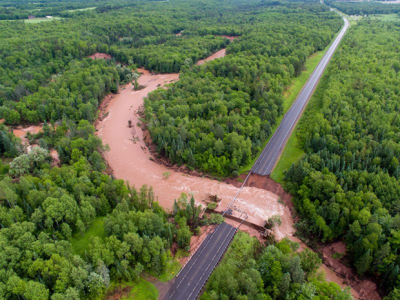Fish Creek in northwestern Wisconsin is a Class I trout stream that drains directly into Chequamegon Bay, which provides the city of Ashland’s drinking water supply. On Father’s Day in 2018, a severe storm caused widespread flooding and road damage, leading to bluff erosion and destruction of natural fish habitat. Since 2018, the Northland College’s Mary Griggs Burke Center for Freshwater Innovation has successfully coordinated three bluff stabilization projects along North Fish Creek. The College released a video offering a glimpse into the work accomplished to date to improve fish habitat and mitigate excessive sedimentation in North Fish Creek, all funded through GLRI programs.
“Projects like these not only enhance water quality and fish habitat, but also safeguard the pristine beauty of Chequamegon Bay by preventing excess sediment from entering its waters,” said Matt Hudson, the Burke Center’s associate director—Great Lakes. “Moreover, they help build resilience into our natural systems, acting as a buffer against the challenges posed by our changing climate.”
New work is underway on Phase 3 restoration efforts in North Fish Creek that will protect approximately 2,200 feet of stream channel and save an estimated 4,300 tons of sediment from eroding into the stream on an annual basis. This work is supported by a grant of nearly $300,000 in GLRI funding recently awarded from the Great Lakes Sediment and Nutrient Reduction Program. This is in addition to $200,000 of new funding received from the US Fish and Wildlife Service Coastal Program this summer.


